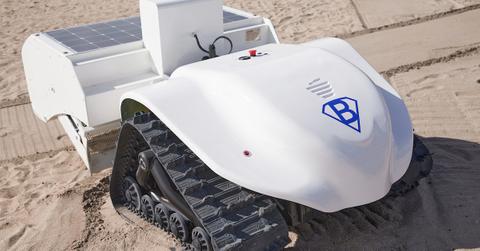Remote-Controlled Trash Drones Are Cleaning up Lake Erie’s Shorelines
Published Sept. 7 2022, 11:14 a.m. ET
If you're local to any of the Great Lakes, you're likely aware of how polluted they are with sewage, chemicals, and most commonly, trash. President Joe Biden invested $1 billion in a massive Great Lakes cleanup earlier this year, but the shorelines are still sadly littered with plastics and debris.
That's why a regional supermarket chain, Meijer, donated $1 million to clean up midwestern waterways — so if you see remote-controlled trash drones cleaning up Lake Erie, don't be alarmed.
After identifying the plastics pollution problem in the Great Lakes, Meijer donated to the Council of the Great Lakes Region (CGLR Foundation).
"We are lucky to live near the beautiful Great Lakes, which not only provide immense economic value to the region, but they also act as a hub for recreation, travel and biodiversity. It's our responsibility to protect them," Vik Srinivasan, Senior Vice President of Properties and Real Estate of Meijer, stated in a press release.
"These lakes represent a fifth of the world's surface freshwater," he continued. "And our partnership with the Council of the Great Lakes is the perfect opportunity for Meijer to be hands-on in the protection of our local waterways."
Lake Erie's remote-controlled trash drones are solar- and battery-powered.
Within the next month, beach- and water-trolling trash drones will be gobbling up litter left behind by careless beachgoers. The CGLR Foundation first launched its Great Lakes Plastic Clean Up initiative in 2020, according to Cleveland.com, and teamed up with Canadian-based Pollution Probe. Michigan-based Meijer then donated $1 million to make the drones a reality.
The money from Meijer bought four beach-cleaning BeBots, four water-cleaning Pixie Drones, and eight trailers to transport them all.
Each of the drones are remote-controlled and solar-powered. They can collect debris as small as half an inch, and can inhale upwards of 200 pounds of material per trip. They can also produce data on the water, including water temperature and even acidity.
Many also hope this beach- and waterway-cleaning initiative will ultimately help prevent the spread of microplastics — ideally, the drones will pick up different plastics before they end up breaking down to such small sizes.
Once the BeBots and Pixie Drones have picked up as much trash as they can, humans will sort and analyze the trash, for intel on the types of debris and possible sources of the waste. Although the drones will be able to pick up organic materials such as driftwood and lake weed, all natural findings will be returned to their environment.
The drones will be shared across various locations in the midwest, including Lake Erie's popular Edgewater Beach — so hopefully, this will make a difference.
But, this won't help Lake Erie's sewage problem.
Though Lake Erie will be less littered with trash, sewage could still persist as a major issue contaminating its waters.
In the last few months, sewage and stormwater has overflown into the lake on more than one occasion. Beachgoers were advised to stay out of the water, over bacterial concerns — namely unusually high level of E. coli.
Combined sewer overflow (CSO) has been an issue for Lake Erie for decades — as far back as the 1970s. Plans were put in place to redirect the sewage in 2010, but evidently, it's still a huge problem.
